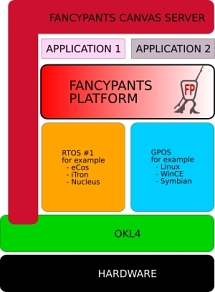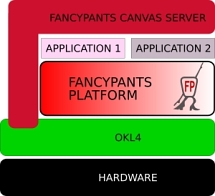Software stack targets Linux devices
Jul 26, 2007 — by LinuxDevices Staff — from the LinuxDevices Archive — 2 viewsFluffy Spider Technologies (FST) and Open Kernel Labs (OKL) are readying a jointly-developed software stack that targets Linux-based embedded systems and devices. Due for release by year end, the combined stack integrates the former's “FancyPants” lightweight GUI (graphical user interface) platform with the latter's “OKL4” microkernel and virtualization technology.
 According to FST, FancyPants (screenshot at right) requires less that 3MB of disk space, yet can apply sophisticated special effects over on-screen elements, including images and playing videos. Effects are said to include soft shadows, screen and image transitions, fades and wipes, 32-bit alpha blending, animations, glitter, color manipulation, scaling, rotation, 3D folds, and more.
According to FST, FancyPants (screenshot at right) requires less that 3MB of disk space, yet can apply sophisticated special effects over on-screen elements, including images and playing videos. Effects are said to include soft shadows, screen and image transitions, fades and wipes, 32-bit alpha blending, animations, glitter, color manipulation, scaling, rotation, 3D folds, and more.
OKL's OKL4 microkernel, meanwhile, includes a real-time POSIX execution environment, and can serve as a virtual platform for running various “guest OSes” such as Linux. Touted OKL4 features and benefits include virtualization, security, legacy reuse, IP protection, and license separation. Additionally, OKL claims the product “protects communications firmware from interference through fault containment.”
FST and OLK say their combined software stack can be used as the basis of reliable and affordable embedded designs — both with (below left) and without (below right) a guest OS — for devices such as smartphones, TV set-top boxes, point-of-service terminals, kiosks, in-car systems, and building automation devices.


The combined stack can be used with (left) or without (right) a “guest OS”
(Click each image to enlarge)
The combined stack offers device-makers the ability to “quickly and easily create embedded applications with a breathtaking look and feel, while reducing development and hardware costs,” the companies said in a statement. Additionally, the stack's modular nature should be of particular interest to device-makers seeking to reuse application software on multiple OSes.
OK Labs CEO Steve Subar stated, “OKL4 offers embedded systems developers a proven and economical approach to building trusted systems.”
The new bundle, expected to be available during the fourth quarter of 2007, is the outcome of an R&D and marketing alliance announced in April, building upon an initial agreement forged in 2006 between FST and NICTA, Australia's ICT Research Centre of Excellence and the incubator for the Open Kernel Labs microkernel.
The companies are also offering to outsource the complete software development lifecycle of next generation products. This, they say, can provide “a quick and easy way for OEMs [original equipment manufacturers] to transition to other operating systems… with minimal, if any, modifications to their existing applications.”
This article was originally published on LinuxDevices.com and has been donated to the open source community by QuinStreet Inc. Please visit LinuxToday.com for up-to-date news and articles about Linux and open source.